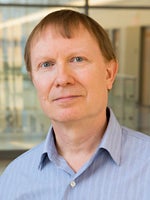Edward Zulkoski, PhD candidate
David R. Cheriton School of Computer Science
Dimitrios Skrepetos, PhD candidate
David R. Cheriton School of Computer Science
Xiao-Bo Li, PhD candidate
David R. Cheriton School of Computer Science

Joe Mitchell
Department of Applied Mathematics and Statistics
State University of New York at Stony Brook
Marijn Heule, Research Assistant Professor
University of Texas at Austin
Progress in satisfiability (SAT) solving has enabled answering long-standing open questions in mathematics completely automatically, resulting in clever though potentially gigantic proofs. We illustrate the success of this approach by presenting the solution of the Boolean Pythagorean triples problem. We also produced and validated a proof of the solution, which has been called the "largest math proof ever."
Saman Barghi, PhD candidate
David R. Cheriton School of Computer Science
Dallas Fraser, Master’s candidate
David R. Cheriton School of Computer Science
Combining text and mathematics when searching in a corpus with extensive mathematical notation remains an open problem. Recent results for math information retrieval systems on the math and text retrieval task at NTCIR-12, for example, show room for improvement, even though formula retrieval appears to be fairly successful.
Yifan Zhang, Master’s candidate
David R. Cheriton School of Computer Science
Explore. Build. Win.
You are invited to participate in the second Waterloo Datathon this May 12, 2018.
Junnan Chen, Master’s candidate
David R. Cheriton School of Computer Science
Conversations depend on information from the context. To go beyond one-round conversation, a chatbot must resolve contextual information such as: 1) co-reference resolution, 2) ellipsis resolution, and 3) conjunctive relationship resolution.
There are simply not enough data to avoid these problems by trying to train a sequence-to-sequence model for multi-round conversation similar to that of one-round conversation.
Babar Naveed Memon, Master’s candidate
David R. Cheriton School of Computer Science
Remote Direct Memory Access (RDMA) can be used to implement a shared storage abstraction or a shared nothing abstraction for distributed applications. We argue that the shared storage abstraction is an overkill for loosely coupled applications and that the shared nothing abstraction does not leverage all the benefits of RDMA.
Please note: This seminar has been cancelled.
Alex C. Williams, PhD candidate
David R. Cheriton School of Computer Science
Mohammad Zokaei Ashtiani, PhD candidate
David R. Cheriton School of Computer Science
Kareem El Gebaly, PhD candidate
David R. Cheriton School of Computer Science
Bryan Muscedere, Master’s candidate
David R. Cheriton School of Computer Science
Ivana Kajić, PhD candidate
David R. Cheriton School of Computer Science
Edward Cheung, PhD candidate
David R. Cheriton School of Computer Science
GIRLsmarts4tech is an outreach program aimed at inspiring girls to explore technology. During the day-long workshop, girls will learn about various aspects of computer science, including mobile app design and programming, user interfaces, and how computer science applies in other fields and disciplines.
Grades 7 and Grade 8 girls who have no programming experience and who are interested in learning computer science are encouraged to register for this event.
Equithon is a student-run hackathon where participants create solutions for a variety of social equality issues. Our goal is to create an inclusive environment where all attendees feel comfortable learning, sharing their ideas, and making something amazing that can improve the lives of many.
Meng Tang, PhD candidate
David R. Cheriton School of Computer Science
Xinan Yan, PhD candidate
David R. Cheriton School of Computer Science
Daniel Recoskie, PhD candidate
David R. Cheriton School of Computer Science
Edward Cheung, PhD candidate
David R. Cheriton School of Computer Science
Andrew Pham, Master’s candidate
David R. Cheriton School of Computer Science
Modern software development workflows are considerably agile, meaning that the work is broken up into individual stories or pieces that are divvied up among the engineers on a team. Each developer is responsible for a certain number of units of work per two-week sprint and must also manage the backlog to make sure that pending features are correctly prioritized, delegated, and removed if necessary.
Dimitrios Skrepetos, PhD candidate
David R. Cheriton School of Computer Science





